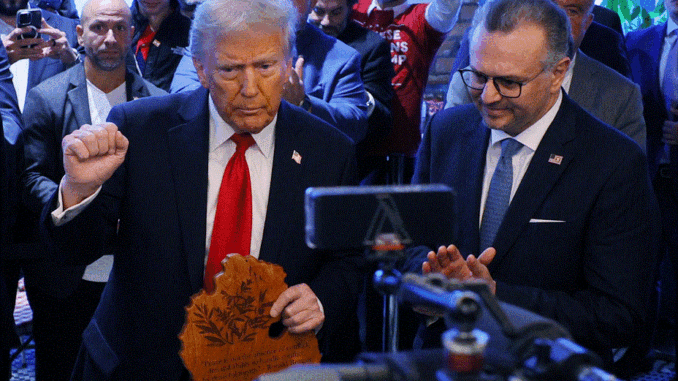
NEW YORK —Donald Trump on Tuesday asked a New York state judge to dismiss the criminal case in which he was convicted in May of 34 felony counts involving hush money paid to a porn star in light of his victory in the Nov. 5 U.S. presidential election.
In urging Justice Juan Merchan in Manhattan to vacate the guilty verdict and toss the charges, Trump’s lawyers said having Manhattan District Attorney Alvin Bragg’s case hang over him after he takes office on Jan. 20 would impede his ability to govern.
“Local elected officials such as D.A. Bragg have no valid basis to cause such disruptions,” defense lawyers Todd Blanche and Emil Bove wrote in a court filing dated Dec. 2 and made public on Tuesday.
Trump in November nominated Blanche to serve as deputy attorney general, the second-highest position at the Justice Department, during his administration. He nominated Bove to serve as Blanche’s top deputy and to be acting deputy attorney general while Blanche awaits confirmation.
Merchan last month delayed Trump’s previously scheduled Nov. 26 sentencing indefinitely to give him the chance to seek dismissal.
Prosecutors with Bragg’s office supported delaying the sentencing to give Trump the chance to make his case for dismissal, though they said they would oppose that bid. The prosecutors have until next Monday to respond.
The judge has not indicated when he would rule on Trump’s motion to dismiss, and has not set a new date for sentencing.
Bragg’s office has suggested he defer all proceedings in the case until Trump, 78, leaves the White House in 2029.
In their motion to dismiss, Trump’s lawyers called that suggestion “ridiculous.” They said that would mean sentencing would happen more than a decade after the investigation started in 2018.
A spokesperson for Bragg’s office declined to comment.
The New York case stemmed from a $130,000 payment Trump’s former lawyer Michael Cohen made to adult film actress Stormy Daniels for her silence before the 2016 election about a sexual encounter she has said she had a decade earlier with Trump, who denies it.
A Manhattan jury found Trump guilty of falsifying business records to cover up his reimbursement of Cohen. It was the first time a U.S. president – former or sitting – had been convicted of or charged with a criminal offense.
Trump pleaded not guilty in the case, which he has sought to portray as a politically motivated attempt by Bragg, a Democrat, to interfere with his presidential campaign.
Falsification of business records is punishable by up to four years in prison. Before he was elected, experts said it was unlikely – but not impossible – that Trump would face time behind bars, with punishments such as a fine or probation seen as more likely.
Trump’s victory over Democratic Vice President Kamala Harris in the Nov. 5 election made the prospect of imposing a sentence of jail or probation even more politically fraught and impractical, given that a sentence could have impeded his ability to conduct the duties of the presidency.
Trump was charged in three additional state and federal criminal cases in 2023, one involving classified documents he kept after leaving office and two others involving his efforts to overturn his 2020 election loss.
He pleaded not guilty in all three cases. None have gone to trial.
A Washington judge on Nov. 25 dismissed the federal criminal case over his attempts to hold onto power. Prosecutors had moved to drop both that case and the classified documents case due to a Justice Department policy against prosecuting a sitting president.
Trump also faces state criminal charges in Georgia over his bid to reverse his 2020 loss in that state, but that case remains in limbo.
As president, Trump would have no power to shut down the New York or Georgia cases because they were filed in state courts.—Reuters





Be the first to comment